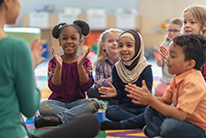“We have to keep in mind that children on the move are first and foremost children and their rights move with them!” Dr. Najat Maalla M’jid, Special Representative of the United Nations Secretary-General on Violence against Children
A webinar series on Resilience and Children on the Move, took place from September to November 2021, gathering more than 350 participants in three sessions. Throughout the sessions, participants shared experiences and best practices to support, protect and nurture the physical, socio-emotional, and spiritual well-being of children on the move.
The recommendations and interventions from children on the move, faith leaders and faith actors, experts, and academic and civil society practitioners highlighted the importance of faith-sensitive mental health and psychosocial support approaches as a crucial factor to foster the resilience and well-being of children on the move, particularly during the COVID-19 pandemic. The discussions looked particularly at the role of faith communities.
“The opportunities and support offered by faith communities in my host countries India and Pakistan are one of the factors that helped me grow and achieve my goals in terms of education and allowed me to also contribute actively to the society.” Hayat, Refugee from Afghanistan
“Children on the Move” is an umbrella term used to define children who are migrating or are moving due to various reasons that could include conflict, poverty, violence, natural disasters, climate change, discrimination, or lack of access to education or other services. Children affected by forced migration and displacement are one of the world’s most vulnerable populations.
Typical mental health and psychosocial support (MHPSS) interventions do not incorporate children’s spiritual nurture as a pathway to resilience. Faith-sensitive MHPSS approaches play a crucial role in promoting the well-being of children on the move. Faith-sensitive MHPSS approaches can restore connections and relationships among children and adults and enhance a child’s sense of belonging and resilience capacity.
“Mental health and psychosocial support interventions provide children with spaces of relative safety and moments of joy and relief, where children can learn and socialize, where children on the move can just be children”. Ms. Rania Al Ayoubi, Founder Image for Education, Jordan
Building on the exchange of experiences, insights, and emerging practices, a booklet titled Faith Sensitive Mental Health and Psychosocial Support (MHPSS) to Foster Resilience in Children on the Move was developed. The booklet examines specific psychosocial support interventions that support, protect, and nurture migrant children’s physical, socio-emotional, and spiritual well-being.
This resource was designed to raise awareness about the effectiveness of faith-inspired psychosocial support frameworks to support the resilience and well-being of children on the move. It presents the specific mental health and psychosocial challenges affecting children on the move and how an integrated response—including MHPSS, spiritual nurture—might address some of those issues.
The booklet introduces emerging practices from local faith actors and young people that have proved effective to support the mental and emotional well-being of children on the move; and presents concrete recommendations to raise awareness about this topic among governments in host countries and donor governments, as well as humanitarian actors.
The three-part virtual series was developed by Arigatou International, the KAICIID International Dialogue Centre, and World Vision International in the framework of the Sustaining Peace and Health workstreams of the International Partnership on Religion and Sustainable Development (PaRD).
The organizations are active members of PaRD, a network that brings together governments and international organizations with diverse civil-society organizations that work with faith communities to engage the social capital vested in faith communities for sustainable development and humanitarian assistance.
We thank the distinguished panel of discussants, whose sharing of their research, practices, insights, and concrete recommendations on the topic made the whole process a rich and fruitful learning experience. We also thank the participants for their interest and commitment to children’s rights and well-being.
